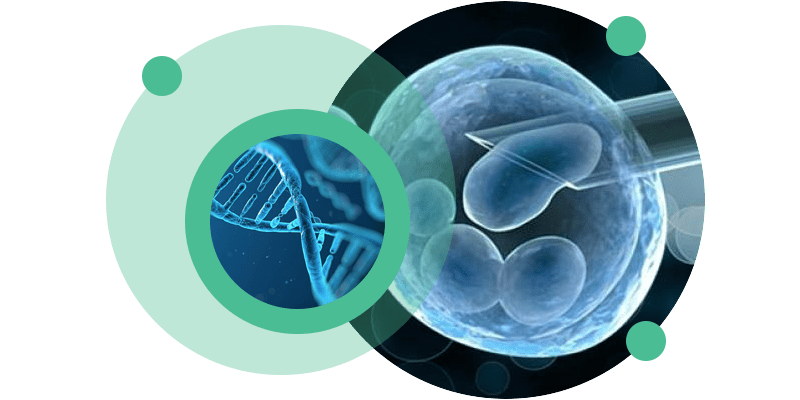(PGT)
Pre Implantation Genetic Testing
Pre-Implantation Genetic Testing (PGT)
Pre-implantation genetic testing, or PGT, is a screening process that is used during in-vitro fertilisation (IVF) to analyse embryos. In this process, embryos are evaluated for any genetic abnormalities before they are implanted into the uterus.
PGT is done before the transfer because it allows for the selection of embryos with the highest likelihood of implantation for a successful pregnancy. Screening the embryos is an important procedure in IVF, as it reduces the risk of genetic abnormalities or chromosomal defects and also reduces the risk of miscarriages.

Who Are the Ideal Candidates for PGT?
- Women who are over the age of 37 are at higher risk of genetically abnormal embryos.
- Women who had one or two miscarriages.
- Women who have experienced previously failed embryo implantation.
- Women who have undergone numerous unsuccessful fertility treatments.
- Couples who have a history of having a child affected by an inherited genetic disease.
What are the different types of pre-implantation genetic testing?
Pre-implantation genetic testing, or PGT, is of mainly three different types, and includes the following:
- Pre-implantation genetic testing for aneuploidy (PGT-A)
This screening test focuses on screening the embryos for certain chromosomal abnormalities known as aneuploidy. PGT-A helps in the identification of chromosomally normal embryos, which increases the chances of successful implantation. It also reduces the risk of miscarriages. - Pre-implantation genetic testing for monogenic disorders (PGT-M)
Pre-implantation genetic testing for monogenic disorders is used during in vitro fertilization (IVF) to screen embryos for specific genetic conditions or disorders before they are implanted into the uterus. The screening process is performed when a patient has an increased risk for a specific genetic condition in their embryos. - Pre-implantation genetic testing for structural rearrangements (PGT-SR)
This screening is done when a patient or their partner has a rearrangement of their chromosomes, like a translocation or inversion. These disorders are caused by mutations or abnormalities in a single gene and can lead to various inherited conditions, such as cystic fibrosis and sickle cell anaemia.
How is pre-implantation genetic testing done?
Pre-implantation genetic testing is done for couples undergoing assisted reproductive techniques. This is done during the process to screen embryos for genetic disorders before implanting the embryo into the uterus so that it reduces the risk of passing inherited genetic conditions to their offspring.
- The process involves medications to stimulate the woman’s ovaries to produce multiple follicles.
- Once the eggs are mature enough, they are retrieved from the woman’s ovaries.
- Then, in the laboratory, the retrieved eggs are combined with the male partner’s sperm or donor sperm through either the IVF or ICSI technique.
- After some days, when embryos reach the blastocyst stage, a small number of cells are carefully removed from each embryo for genetic testing.
- After genetic testing, the embryos that are found to be free from any genetic abnormalities are categorised for transfer into the woman’s uterus. This transfer is done by using a thin catheter inserted through the cervix.
Benefits of Pre-implantation Genetic Testing
There are numerous benefits to pre-implantation genetic testing, and that includes the following:
- Reduce the risk of genetic disorders.
- Increase the chances of a successful pregnancy.
- Screening the embryos minimises the risk of miscarriage and failed implantation.
- Allow the couples to make informed decisions.
- Minimise the risk of passing on genetic disorders to future generation.

Dr Hina Ali
MBBS (Maulana Azad Medical College, New Delhi), MS (University College Of Medical Sciences & GTB hospital, Delhi)
Book An Appointment Today!
Contact Us
Get In Touch With Us
- Address
Cloudnine Hospital - Lucknow
CP - 3, Near Hahnemann Road,
Viraj Khand, Gomti Nagar, Lucknow,
Uttar Pradesh , 226010
CP - 3, Near Hahnemann Road,
Viraj Khand, Gomti Nagar, Lucknow,
Uttar Pradesh , 226010
- Timing
10:00 a.m To 04:00 p.m ( Monday - Saturday )
Sunday Closed
Sunday Closed